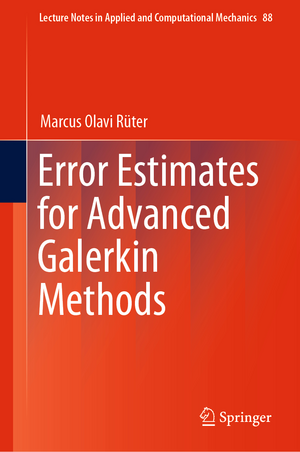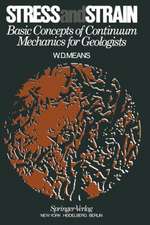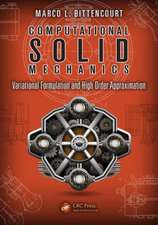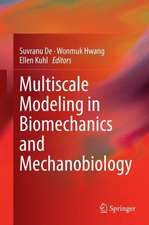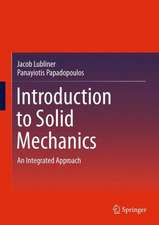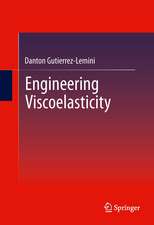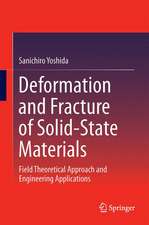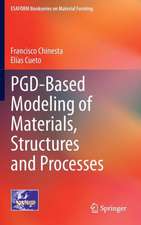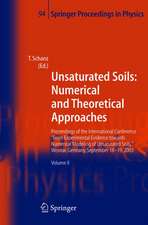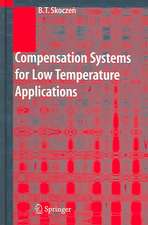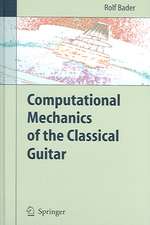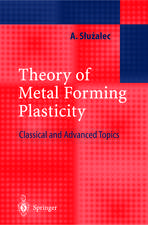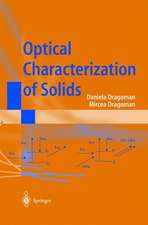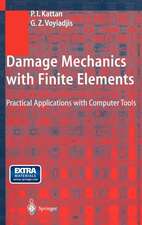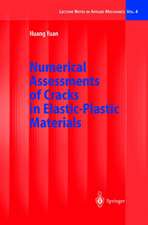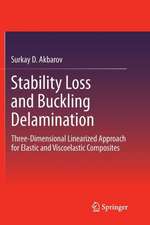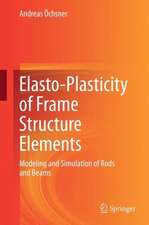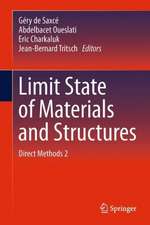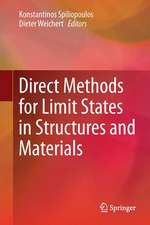Error Estimates for Advanced Galerkin Methods: Lecture Notes in Applied and Computational Mechanics, cartea 88
Autor Marcus Olavi Rüteren Limba Engleză Hardback – 8 noi 2019
Din seria Lecture Notes in Applied and Computational Mechanics
- 19%
 Preț: 422.94 lei
Preț: 422.94 lei - 18%
 Preț: 1008.12 lei
Preț: 1008.12 lei - 18%
 Preț: 1120.18 lei
Preț: 1120.18 lei - 20%
 Preț: 560.79 lei
Preț: 560.79 lei - 18%
 Preț: 948.16 lei
Preț: 948.16 lei - 15%
 Preț: 643.65 lei
Preț: 643.65 lei - 18%
 Preț: 956.81 lei
Preț: 956.81 lei - 18%
 Preț: 957.62 lei
Preț: 957.62 lei - 15%
 Preț: 649.87 lei
Preț: 649.87 lei - 18%
 Preț: 1224.54 lei
Preț: 1224.54 lei - 18%
 Preț: 956.50 lei
Preț: 956.50 lei - 18%
 Preț: 954.45 lei
Preț: 954.45 lei - 18%
 Preț: 948.92 lei
Preț: 948.92 lei - 18%
 Preț: 949.55 lei
Preț: 949.55 lei - 15%
 Preț: 644.49 lei
Preț: 644.49 lei - 18%
 Preț: 1234.62 lei
Preț: 1234.62 lei - 18%
 Preț: 777.69 lei
Preț: 777.69 lei - 18%
 Preț: 1221.83 lei
Preț: 1221.83 lei - 15%
 Preț: 643.00 lei
Preț: 643.00 lei - 18%
 Preț: 956.33 lei
Preț: 956.33 lei - 15%
 Preț: 640.88 lei
Preț: 640.88 lei - 15%
 Preț: 645.79 lei
Preț: 645.79 lei - 18%
 Preț: 944.99 lei
Preț: 944.99 lei - 18%
 Preț: 956.18 lei
Preț: 956.18 lei - 18%
 Preț: 1236.69 lei
Preț: 1236.69 lei - 18%
 Preț: 953.97 lei
Preț: 953.97 lei - 15%
 Preț: 640.88 lei
Preț: 640.88 lei
Preț: 657.39 lei
Preț vechi: 773.41 lei
-15% Nou
Puncte Express: 986
Preț estimativ în valută:
125.80€ • 130.60$ • 104.90£
125.80€ • 130.60$ • 104.90£
Carte tipărită la comandă
Livrare economică 24 martie-07 aprilie
Preluare comenzi: 021 569.72.76
Specificații
ISBN-13: 9783030061722
ISBN-10: 3030061728
Pagini: 489
Ilustrații: XIV, 496 p. 766 illus., 179 illus. in color.
Dimensiuni: 155 x 235 mm
Greutate: 0.89 kg
Ediția:1st ed. 2019
Editura: Springer International Publishing
Colecția Springer
Seria Lecture Notes in Applied and Computational Mechanics
Locul publicării:Cham, Switzerland
ISBN-10: 3030061728
Pagini: 489
Ilustrații: XIV, 496 p. 766 illus., 179 illus. in color.
Dimensiuni: 155 x 235 mm
Greutate: 0.89 kg
Ediția:1st ed. 2019
Editura: Springer International Publishing
Colecția Springer
Seria Lecture Notes in Applied and Computational Mechanics
Locul publicării:Cham, Switzerland
Cuprins
Introduction.- Newtonian and Eshelbian Mechanics.- Boundary Value Problems.- Galerkin Methods.- Numerical Integration.- Energy Norm A Posteriori Error Estimates.- Goal-oriented A Posteriori Error Estimates in Linearized Elasticity.- Goal-oriented A Posteriori Error Estimates in Finite Hyperelasticity.- Numerical Examples.- The Nonstandard Dyadic Product Operators.- Push-forward and Pull-back Operations.- Tensor derivatives.- A Generalized Nitsche Method.- The J-integral in Elastic FractureMechanics.- Linearizations.- Materials investigated in this monograph.- Functional Analysis—A Synopsis.
Textul de pe ultima copertă
This monograph provides a compendium of established and novel error estimation procedures applied in the field of Computational Mechanics. It also includes detailed derivations of these procedures to offer insights into the concepts used to control the errors obtained from employing Galerkin methods in finite and linearized hyperelasticity. The Galerkin methods introduced are considered advanced methods because they remedy certain shortcomings of the well-established finite element method, which is the archetypal Galerkin (mesh-based) method. In particular, this monograph focuses on the systematical derivation of the shape functions used to construct both Galerkin mesh-based and meshfree methods. The mesh-based methods considered are the (conventional) displacement-based, (dual-)mixed, smoothed, and extended finite element methods. In addition, it introduces the element-free Galerkin and reproducing kernel particle methods as representatives of a class of Galerkin meshfree methods. Including illustrative numerical examples relevant to engineering with an emphasis on elastic fracture mechanics problems, this monograph is intended for students, researchers, and practitioners aiming to increase the reliability of their numerical simulations and wanting to better grasp the concepts of Galerkin methods and associated error estimation procedures.
Caracteristici
Sheds light on various aspects of the error estimation procedures, as well as on nonlinear problems within the framework of finite hyperelasticity Showcases comparative numerical examples for problems in elastic fracture mechanics Provides a comprehensive compendium, from continuum mechanics, boundary value problems and their discretization, as well as numerical integration into error estimation procedures
